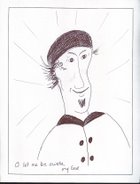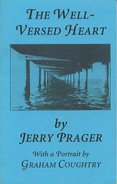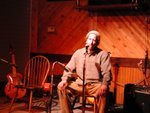The photo of Milton Acorn
hung in the shadows of the tavern,
his cragged face weary
with bagged eyes, bulging hardships
falling free down flat
cheekbones sustained by a steady gaze;
his wild hair swept back
as if by an unconscious hand,
grooming that had also
grazed his goatee,
causing it to jut
towards the future,
towards the direction he was
intent on taking,
the direction he had always
taken, the way
of solidarity with the long
suffering.
It was a nicotine-stained,
framed image of a writer
his peers had dubbed the
People's Poet.
Acorn, the unashamed communist with the carpenter's hands
Acorn, the unashamed communist with the carpenter's hands
and the sprawling soul
troubled by war wounds and drink,
came into his voice on the provincial sandbar that is Prince Edward Island,
came into his voice on the provincial sandbar that is Prince Edward Island,
the place to which
he soon after the picture was hung returned his remaining years.
Long ago, I sat in
Grossman's tavern looking at his image,
studying the dedication to
a man who reminded me of my father
and grandfather: the
same shattered, political romanticism
held together by the will
of their dialectic acuity:
minds that would never
give up the struggle,
hearts that found
company among the misbegotten
and among the deep
dreaming word workers
slurring themselves to
sleep in the company of fellow travelers
who always made sure they
arrived safely.
I have no idea why the
memory of Acorn returned to me,
I can't even remember if
he and I were ever
in the same place at the
same time or not,
it just feels like we
were; feels like I have been celebrating
the same exuberance of
longing in the
anguish of existence,
defending the poet's need to speak a better world into being,
defending the poet's need to speak a better world into being,
the need to accept
love in all the places we find it,
the need to overthrow misery within and without,
the need to discover mercy in the tender twilight
where dune grasses still trace haikus on tidal pool sands;
where dune grasses still trace haikus on tidal pool sands;
where wild bay leaf
bushes on the beach at Dalvay
spoke his name to the sea of his childhood.
I also remember liking one of
his poems on a poster on the subway
but don't recall a word of it; I remember as well singing
“spun you out of my eyes fire” to my Perth County Conspiracy album,
but don't recall a word of it; I remember as well singing
“spun you out of my eyes fire” to my Perth County Conspiracy album,
and the hard way the
People's Poet wore his gentleness on the tip of his pen.
Mostly, I remember the stained
paean to Acorn on that tavern wall when I was young
and first burned with the
need to un-wound the world, I remember failing at that,
and writing another poem
anyway, as if sorrow contained its own antidote;
as if joy was an act of defiance, a conflagration triggered by
the breaking of humanity; a purifying blaze
born in utterance and fed by abandoned reiteration.
the breaking of humanity; a purifying blaze
born in utterance and fed by abandoned reiteration.



